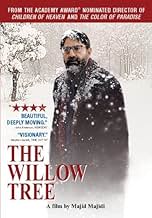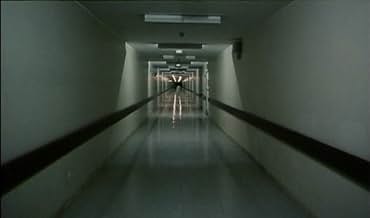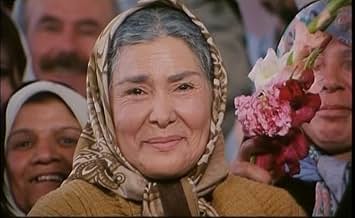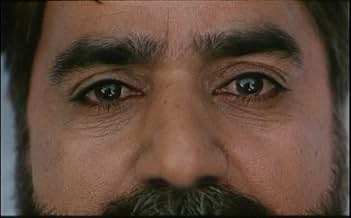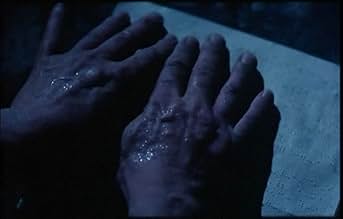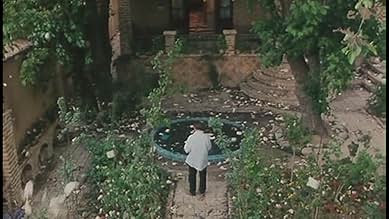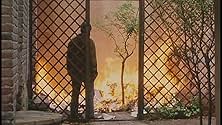NOTE IMDb
7,3/10
4,6 k
MA NOTE
Ajouter une intrigue dans votre langueYoussef, a blind university professor, is suddenly diagnosed with a fatal disease and must undergo treatment in France. Back home, will he find the life he had before?Youssef, a blind university professor, is suddenly diagnosed with a fatal disease and must undergo treatment in France. Back home, will he find the life he had before?Youssef, a blind university professor, is suddenly diagnosed with a fatal disease and must undergo treatment in France. Back home, will he find the life he had before?
- Réalisation
- Scénario
- Casting principal
- Récompenses
- 2 victoires et 2 nominations au total
Soghra Obeisi
- Aziz
- (as Afarin Obeisi)
Leila Otadi
- Pari
- (as Leila Outadi)
Avis à la une
I saw this at the 2005 TIFF to a packed audience.
This was an eye-opening movie in a couple ways.
Not only is this drama about a blind Iranian man who unexpectedly comes upon sight during a routine eye operation in Paris, but it opened my eyes to the value of sight in life.
The main character in this movie has been living life without sight for 38 years, so much so that we see the habits, the challenges, the braille reading, and the support his friends and family give him and which he is subtly dependent upon. Yet when this miraculous chance to see gives him, shall we say, a second chance, what does he do with it? In fact what would anyone do with it? What I liked most about this was that the challenge posed to the lead character and the choices he made were so very real with the challenges and dilemma of his choices and frustration clear. This made me consider the choices *I* have been making in life. If I were given a second chance with anything, what would *I* do with it? This was a thought-provoking movie that took me into a world I have never experienced. And while I have seen movies about blind people, this movie really seemed to capture the view of life from this particular blind man: his challenges; his decisions; and most importantly, his emotional state.
This is a smart and very real movie that was moving, thought-provoking. Visually speaking, the weaving of light with dark scenes allows the story to further come to life giving a final illumination on a story that shares, sympathizes and delivers.
This is a well-done piece of work! Congratulations!
This was an eye-opening movie in a couple ways.
Not only is this drama about a blind Iranian man who unexpectedly comes upon sight during a routine eye operation in Paris, but it opened my eyes to the value of sight in life.
The main character in this movie has been living life without sight for 38 years, so much so that we see the habits, the challenges, the braille reading, and the support his friends and family give him and which he is subtly dependent upon. Yet when this miraculous chance to see gives him, shall we say, a second chance, what does he do with it? In fact what would anyone do with it? What I liked most about this was that the challenge posed to the lead character and the choices he made were so very real with the challenges and dilemma of his choices and frustration clear. This made me consider the choices *I* have been making in life. If I were given a second chance with anything, what would *I* do with it? This was a thought-provoking movie that took me into a world I have never experienced. And while I have seen movies about blind people, this movie really seemed to capture the view of life from this particular blind man: his challenges; his decisions; and most importantly, his emotional state.
This is a smart and very real movie that was moving, thought-provoking. Visually speaking, the weaving of light with dark scenes allows the story to further come to life giving a final illumination on a story that shares, sympathizes and delivers.
This is a well-done piece of work! Congratulations!
Never have I seen such a topic on-reel. And Majid Majidi does it with finesse, cooked up with traces of sentiments and etching up emotions into a beautiful layer of life lesson.
The Willow Tree talks about a taciturn, blind professor and his lives, before and after a surgery that changes his life forever. Before, he is calm and loving. He loves his family & work. Then comes life values and when God puts him on test, things go pumping and wrecking. What brought luck to him, snatches all his glorious memories and turns him into something he never thought he'd become.
The plot goes heavy on the darker and duller side towards the end, depicting how life can turn upside down, if we slip the path once. Chiefly, it talks about the dangers of life that we want or never ever dreamed of. Lots of thing depicted, lots of things to learn, this film is a perfect blend of life and interpretation. It cannot be debated as to why the divine power creates things as they are and this story gives us a promising insight. Cast is so beautifully active, the message is brightly conveyed. Music is very good.
BOTTOM LINE: Majidi is a master and as like all his films, this one is another feather in his hat.
Profanity/Vulgarity/Sex/Porn: No | Violence: Mediocre | Gore/Alcohol/Smoking: No | Gore: Mediocre
The Willow Tree talks about a taciturn, blind professor and his lives, before and after a surgery that changes his life forever. Before, he is calm and loving. He loves his family & work. Then comes life values and when God puts him on test, things go pumping and wrecking. What brought luck to him, snatches all his glorious memories and turns him into something he never thought he'd become.
The plot goes heavy on the darker and duller side towards the end, depicting how life can turn upside down, if we slip the path once. Chiefly, it talks about the dangers of life that we want or never ever dreamed of. Lots of thing depicted, lots of things to learn, this film is a perfect blend of life and interpretation. It cannot be debated as to why the divine power creates things as they are and this story gives us a promising insight. Cast is so beautifully active, the message is brightly conveyed. Music is very good.
BOTTOM LINE: Majidi is a master and as like all his films, this one is another feather in his hat.
Profanity/Vulgarity/Sex/Porn: No | Violence: Mediocre | Gore/Alcohol/Smoking: No | Gore: Mediocre
I have been deeply moved by "The Willow Tree," which I saw this evening as part of an Iranian film series at the Freer Gallery in Washington DC. I am not sure that any Western culture could ever produce something as beautiful, but I hope all westerners see it. It has impressed positively and permanently. I was most moved by the scene of the hero coming back to Iran, and seeing his mother, and then again, when the mother comes to his house after his wife has left. The most beautiful, was our hero looking for the papers in the pond, and finding that special one. The ending is magnificent, as it allows us to ponder which is better, to continue blind, or be blessed again with sight. But in either case he seems condemned. Thank you. James
This film can be described as a companion piece to Majidi's highly acclaimed Color of Paradise. In that movie, in which a father saw his blind son as a burden and not as a blessing, we (& eventually the father) began to "see" the world from the blind boy's view and in doing so saw a much richer, meaningful world. Here, the characters of the father and the son are embodied in a single person: Yusef who after 38 years of being blind regains his sight. What he sees, however, is quite different to what he "saw" as a blind man, and not necessarily more beautiful or rewarding. Majidi takes the viewer to a higher, more spiritual world and in doing so creates another masterpiece. Majidi's movies are visually stunning and have such a profound effect on the viewer that when we leave the cinema, we see the world in a different light. Parviz Parastoui, one of the best actors in the Iranian cinema and theatre, is outstanding as Yusef. Also worth mentioning is Mahmood Kelari's exceptional photography. As in all Majidi films, there are scenes which will stay with you long after the movie is over.
In the lyrical and touching Iranian drama "The Willow Tree," a middle-aged college professor, blind since the age of eight, regains his sight after undergoing a cornea transplant.
Through the years, Yusef has learned to function in a world of darkness. He even long ago stopped blaming God for his condition (he went blind while playing with firecrackers as a boy). Having made his peace with his situation, Yusef is now suddenly confronted with the unforeseen mixed blessing of regaining his sight. On the one hand, he yearns to be able to once again behold the vast and myriad beauties of the visual world; on the other, he risks losing the sense of security and comfort that comes from living in a world that is real and familiar to him.
Director Majid Majidi captures some of the visual sensory overload Yusef experiences when he is once again reunited with the sighted world, which includes seeing his wife and young daughter for the first time. And how will the change in his condition affect the couple's relationship - the roles each of them plays within that relationship, and the ways in which they interact with one another? For now that he is no longer dependent on others to get around and is free to do things on his own, Yusef begins to press against the tightly-bound parameters of his heavily circumscribed life, falling for a beautiful young student in one of his classes and becoming less willing to play the part of the uncomplaining, long-suffering victim to please his wife and mother who have found their own purpose and meaning in taking care of him all these years. Then Fate plays a cruel trick on him, making him realize that he can never be fully happy in either state of sightedness (Majidi doesn't cater to his audience's desire for an uplifting, happy ending).
To emphasize the way in which Yousef experiences the world, the movie features a hyper-sensitive soundtrack filled with the amplified sounds of birds chirping, water gurgling, leaves rustling, raindrops falling, etc. The only real disappointment is the musical score, which is often lugubrious, soupy and overly-emphatic.
Much of "The Willow Trees"'s success can be attributed to Parviz Parastui's subtle and wide-ranging performance in the lead role. As Yusef, Parastui runs the gamut from submissive introvert to railing despondent without hitting a single false note at either end.
Through the years, Yusef has learned to function in a world of darkness. He even long ago stopped blaming God for his condition (he went blind while playing with firecrackers as a boy). Having made his peace with his situation, Yusef is now suddenly confronted with the unforeseen mixed blessing of regaining his sight. On the one hand, he yearns to be able to once again behold the vast and myriad beauties of the visual world; on the other, he risks losing the sense of security and comfort that comes from living in a world that is real and familiar to him.
Director Majid Majidi captures some of the visual sensory overload Yusef experiences when he is once again reunited with the sighted world, which includes seeing his wife and young daughter for the first time. And how will the change in his condition affect the couple's relationship - the roles each of them plays within that relationship, and the ways in which they interact with one another? For now that he is no longer dependent on others to get around and is free to do things on his own, Yusef begins to press against the tightly-bound parameters of his heavily circumscribed life, falling for a beautiful young student in one of his classes and becoming less willing to play the part of the uncomplaining, long-suffering victim to please his wife and mother who have found their own purpose and meaning in taking care of him all these years. Then Fate plays a cruel trick on him, making him realize that he can never be fully happy in either state of sightedness (Majidi doesn't cater to his audience's desire for an uplifting, happy ending).
To emphasize the way in which Yousef experiences the world, the movie features a hyper-sensitive soundtrack filled with the amplified sounds of birds chirping, water gurgling, leaves rustling, raindrops falling, etc. The only real disappointment is the musical score, which is often lugubrious, soupy and overly-emphatic.
Much of "The Willow Trees"'s success can be attributed to Parviz Parastui's subtle and wide-ranging performance in the lead role. As Yusef, Parastui runs the gamut from submissive introvert to railing despondent without hitting a single false note at either end.
Meilleurs choix
Connectez-vous pour évaluer et suivre la liste de favoris afin de recevoir des recommandations personnalisées
Détails
Box-office
- Montant brut aux États-Unis et au Canada
- 25 752 $US
- Week-end de sortie aux États-Unis et au Canada
- 6 048 $US
- 5 août 2007
- Montant brut mondial
- 51 499 $US
- Durée1 heure 36 minutes
- Couleur
- Mixage
- Rapport de forme
- 1.85 : 1
Contribuer à cette page
Suggérer une modification ou ajouter du contenu manquant

